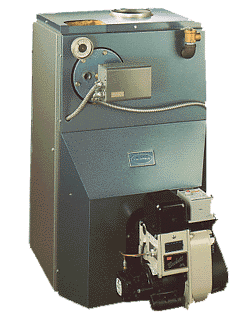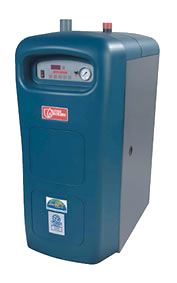A CALL BACK
Fill out the short form below and we'll call you back immediately!
If you need emergency HVAC or fuel delivery service outside of our office hours, call (888) 474-3391
Oil & Gas Boilers
When to Get a New Boiler
Are you considering a boiler replacement? If you system is more than 15 years old, it’s probably time to start thinking about the next installation. Some common signs that you may need a new boiler soon include:
- An unexplained increase in utility bills
- Uneven heating in the home
- Water spots on the floor around the boiler
- Loud operation
It’s best to think ahead when it comes to new appliances. Researching your options early will give you plenty of time to think about what you want in your new boiler. Our technicians are happy to help you explore your options so you can find an installation that fits your budget and your home.
Why Choose Griffith for Your Boiler Needs
It’s important to work with a reliable contractor when you’re scheduling a boiler installation, repair, or maintenance. We offer all three services, so you can consider Griffith a one-stop shop for your home comfort needs. We’ll help investigate any problems you’re having and advise you on the best course of action, keeping your budget and comfort goals in mind. When you’re working with Griffith you’ll enjoy:
- Courteous technicians who will thoroughly explain each service
- 24/7 emergency services when needed
- Transparent pricing so you know what to expect
- Highly trained professionals who can work with any make or model
Brands We Carry
Radiant heating systems provide economical, controlled, and comfortable warmth throughout the entire indoor environment. Griffith Energy Services represents quality oil, gas, and steam boiler manufacturers like Carrier, Utica and Columbia. Boiler systems are available for every application, price range, and heating requirement.
Boiler Care and Maintenance
To keep your boiler in good condition, you should schedule a tune-up once a year with one of our qualified technicians. During your maintenance visit, we will:
- Thoroughly inspect the boiler and check boiler operation
- Examine the flue internally and externally
- Test all safety devices
- Inspect the seals for leaks
- Clean the boiler components as needed.
- Test the heat input and operating pressure
Regular maintenance will improve your energy efficiency, prevent common repair needs, and extend the life of your system. If your boiler is under warranty, an annual tune-up is usually required to keep the warranty in place.
Call the Pros at Griffith Energy Services For Your Boiler Needs
Whether it’s time for boiler maintenance or boiler repair, call the team at Griffith Energy Services for reliable and knowledgeable service.
To learn more about boilers, see our additional information below.
Residential and light commercial boilers are used primarily to heat the interior of a home or office. During the construction phase, piping is installed throughout the building and serves as the distribution network for the transfer medium, which is usually water. Heat energy is released through radiators, convectors or baseboard grilles, and the cooled liquid is circulated back to the boiler, where the cycle is repeated.
Heat generated by a radiant system is generally preferred over a forced-air furnace because it disperses warm air currents more evenly throughout the building, which eliminates cold spots and drafts. Modern boilers are available in gas and oil configurations, and each system has unique features and benefits.
Older gas steam boilers and oil steam boilers use heated water vapor to transfer energy. Due to the inherent disadvantages of the system, including noise levels and operational inefficiency, steam boilers are generally not used in new construction. However, converting an existing steam piping system to water may not be cost effective, especially when the system must be re-piped. Fortunately, modern steam boilers offer improved energy efficiency, better comfort and much lower noise levels.
Oil Boilers
 When the heating cycle is initiated in an oil hot water boiler, liquid is pumped from a storage tank through a fuel line into a specially designed nozzle. Pressure forces a fine mist into the combustion chamber. The atomized oil mixes with air, and the ignition system provides a spark that ignites the oil vapors. The resulting hot gas passes through specially designed tubes in the heat exchanger, and the energy is transferred to the water in the boiler, which is maintained at a predetermined temperature. When the thermostat calls for heat, the water is circulated through the pipes in the building by a pump, and then it returns to the boiler for reheating.
When the heating cycle is initiated in an oil hot water boiler, liquid is pumped from a storage tank through a fuel line into a specially designed nozzle. Pressure forces a fine mist into the combustion chamber. The atomized oil mixes with air, and the ignition system provides a spark that ignites the oil vapors. The resulting hot gas passes through specially designed tubes in the heat exchanger, and the energy is transferred to the water in the boiler, which is maintained at a predetermined temperature. When the thermostat calls for heat, the water is circulated through the pipes in the building by a pump, and then it returns to the boiler for reheating.
Gas Boilers
 Gas boilers are a model of simplicity and efficiency. Natural gas is piped into neighborhoods and the surrounding homes and offices. Gas hot water boilers operate according to the same basic principle as oil models for radiant heating systems, except they employ a simpler combustion chamber and heat exchanger design.
Gas boilers are a model of simplicity and efficiency. Natural gas is piped into neighborhoods and the surrounding homes and offices. Gas hot water boilers operate according to the same basic principle as oil models for radiant heating systems, except they employ a simpler combustion chamber and heat exchanger design.
When the thermostat calls for heat, a valve in the boiler is opened, and gas is injected into the combustion chamber. The gas is subsequently ignited by an electronic ignition system, and a heat exchanger transfers warm energy to the water circulating through the building’s piping system.
Condensing Boilers
Gas condensing boilers are more efficient than conventional boilers since they recover energy from the waste gas normally exhausted through the flue pipe. Specifically, the combustion process produces water vapor, which is condensed back into a liquid. This action releases latent heat, which can raise the efficiency of the unit up to 98 percent.
Oil condensing boilers are also substantially more efficient than standard models, but their Annual Fuel Utilization Efficiency (AFUE) ratings are inferior to equivalent gas-fired boilers with similar capacities.
Is a Gas or Oil Boiler Right For Me?
Purchasing a boiler is a complex decision based on the consumer’s budget, existing heat infrastructure, and operating cost expectations. Oil and gas boilers offer different features, benefits, and maintenance requirements.
Efficiency: All oil and gas boilers carry AFUE ratings to provide a meaningful efficiency comparison between different brands and models of equipment. In general, gas hot water boilers are more efficient than oil hot water boilers with the same heat output.
Prior to selecting a boiler model, it is important to check local fuel costs for both natural gas and fuel oil. While natural gas is less expensive than fuel oil in most regions of the country, there are some areas where the cost of heating oil is significantly reduced because of high local demand. Energy costs are very volatile, and the price of natural gas and fuel oil can fluctuate dramatically over time.
Maintenance: While it is important to properly service all HVAC equipment on a regular basis, oil boilers require more extensive maintenance than their gas counterparts. This is primarily due to the nature of heating oil, which enters the boiler in a liquid form. Nozzles tend to clog over time, and the combustion chamber must be frequently cleaned to remove residue and byproducts left over from the burn cycle.
Conversion Cost: From an installed cost standpoint, a fuel conversion from oil to gas can be expensive, especially if the old fuel tank must be removed. It is also important to establish that gas service is available, and the size of the incoming gas pipe is large enough to provide sufficient volume to satisfy the requirements of the appliance.











